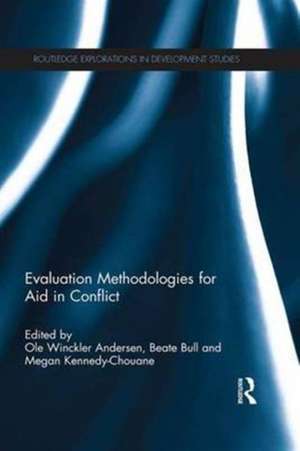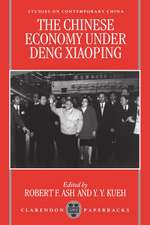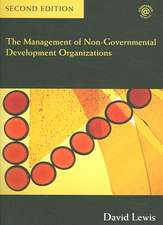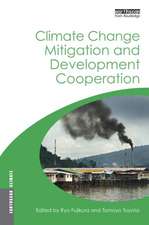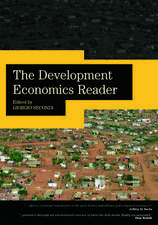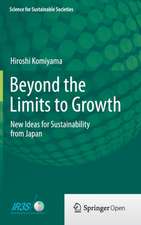Evaluation Methodologies for Aid in Conflict: Routledge Explorations in Development Studies
Editat de Ole Winckler Andersen, Beate Bull, Megan Kennedy-Chouaneen Limba Engleză Paperback – 24 apr 2016
This book analyses evaluation theory and practice in order to help fill this knowledge gap and advocates a realistic and rigorous approach to evaluating international engagement. Through a series of case studies, this book highlights both the promise, and potential pitfalls, of taking a more evaluative approach to understanding aid in conflict regions. These illustrate the methodological and analytical approach taken by researchers working to understand the results and effectiveness of conflict prevention and peacebuilding support. While well-grounded in current theoretical and methodological debates, the book provides valuable practical information by examining how and why different choices were made in the context of each evaluation. The book shows what future steps may be envisaged to further strengthen evaluations of support for conflict prevention and peacebuilding. The analysis draws on a wealth of perspectives and voices to provide researchers and students in development studies and conflict and peace studies as well as development evaluators with a deep and broad understanding of evaluation methods and approaches.
| Toate formatele și edițiile | Preț | Express |
|---|---|---|
| Paperback (1) | 489.26 lei 6-8 săpt. | |
| Taylor & Francis – 24 apr 2016 | 489.26 lei 6-8 săpt. | |
| Hardback (1) | 1058.43 lei 6-8 săpt. | |
| Taylor & Francis – 4 dec 2013 | 1058.43 lei 6-8 săpt. |
Din seria Routledge Explorations in Development Studies
- 8%
 Preț: 389.80 lei
Preț: 389.80 lei -
 Preț: 310.45 lei
Preț: 310.45 lei -
 Preț: 325.72 lei
Preț: 325.72 lei -
 Preț: 325.72 lei
Preț: 325.72 lei -
 Preț: 152.57 lei
Preț: 152.57 lei -
 Preț: 155.44 lei
Preț: 155.44 lei -
 Preț: 311.41 lei
Preț: 311.41 lei - 8%
 Preț: 388.92 lei
Preț: 388.92 lei -
 Preț: 326.96 lei
Preț: 326.96 lei -
 Preț: 311.41 lei
Preț: 311.41 lei -
 Preț: 281.90 lei
Preț: 281.90 lei -
 Preț: 324.67 lei
Preț: 324.67 lei -
 Preț: 482.74 lei
Preț: 482.74 lei -
 Preț: 416.22 lei
Preț: 416.22 lei -
 Preț: 389.38 lei
Preț: 389.38 lei - 28%
 Preț: 821.06 lei
Preț: 821.06 lei -
 Preț: 389.38 lei
Preț: 389.38 lei - 18%
 Preț: 1000.27 lei
Preț: 1000.27 lei - 18%
 Preț: 998.71 lei
Preț: 998.71 lei - 26%
 Preț: 848.96 lei
Preț: 848.96 lei - 18%
 Preț: 1000.27 lei
Preț: 1000.27 lei - 18%
 Preț: 999.61 lei
Preț: 999.61 lei - 16%
 Preț: 299.87 lei
Preț: 299.87 lei -
 Preț: 299.52 lei
Preț: 299.52 lei -
 Preț: 411.42 lei
Preț: 411.42 lei - 14%
 Preț: 297.99 lei
Preț: 297.99 lei - 18%
 Preț: 1057.05 lei
Preț: 1057.05 lei - 18%
 Preț: 1060.25 lei
Preț: 1060.25 lei - 18%
 Preț: 1170.84 lei
Preț: 1170.84 lei - 18%
 Preț: 1000.27 lei
Preț: 1000.27 lei - 25%
 Preț: 544.50 lei
Preț: 544.50 lei - 31%
 Preț: 765.01 lei
Preț: 765.01 lei - 28%
 Preț: 851.46 lei
Preț: 851.46 lei - 18%
 Preț: 1000.27 lei
Preț: 1000.27 lei - 25%
 Preț: 767.38 lei
Preț: 767.38 lei - 31%
 Preț: 763.78 lei
Preț: 763.78 lei - 14%
 Preț: 301.33 lei
Preț: 301.33 lei - 18%
 Preț: 1110.74 lei
Preț: 1110.74 lei -
 Preț: 485.07 lei
Preț: 485.07 lei
Preț: 489.26 lei
Nou
Puncte Express: 734
Preț estimativ în valută:
93.63€ • 101.67$ • 78.65£
93.63€ • 101.67$ • 78.65£
Carte tipărită la comandă
Livrare economică 22 aprilie-06 mai
Preluare comenzi: 021 569.72.76
Specificații
ISBN-13: 9781138687196
ISBN-10: 1138687197
Pagini: 214
Dimensiuni: 156 x 234 x 18 mm
Greutate: 0.45 kg
Ediția:1
Editura: Taylor & Francis
Colecția Routledge
Seria Routledge Explorations in Development Studies
Locul publicării:Oxford, United Kingdom
ISBN-10: 1138687197
Pagini: 214
Dimensiuni: 156 x 234 x 18 mm
Greutate: 0.45 kg
Ediția:1
Editura: Taylor & Francis
Colecția Routledge
Seria Routledge Explorations in Development Studies
Locul publicării:Oxford, United Kingdom
Public țintă
PostgraduateCuprins
1. Introduction 2. Evaluation approaches in situations of conflict and fragility 3. Critical reflections on the South Sudan evaluation of conflict and peacebuilding activities 4. Battlefields of method: Evaluating Norwegian peace efforts in Sri Lanka 5. The Case of Congo: An Evaluation Approach Focusing on Context 6. Assessing Development Co-operation in North East Afghanistan with repeated mixed-method surveys 7. Impact Evaluation for Peacebuilding: challenging preconceptions 8. Evaluating Statebuilding Support: Learning from Experience or Judging from Assumptions? 9. Systems Thinking in Peacebuilding Evaluations: Applications in Ghana, Guinea-Bissau and Kosovo
Recenzii
"This is a well-structured sampler of relevant insights into the methodological issues involved in designing and carrying out evaluations of intervention in conflict situations. The discussion of the main theoretical challenges, complemented with the illustrations of a diverse setting of cases, allows the reader to comprehend the theoretical and practical complexities of undertaking these analyses. An additional strength of the book is the extensive and comprehensive bibliography included at the end of each chapter, useful for those who want to look more closely at the points raised." – European Journal of Development Research, Ines Afonso Roque Ferreira, University of East Anglia, UK
Descriere
Knowledge and rigorous evidence around the role of external development partners in situations of conflict and fragility is still lacking. This book strengthens evaluation theory and practice in order to help fill this knowledge gap and advocates a realistic and rigorous approach to evaluating international engagement. Through a series of case studies, it highlights both the promise, and potential pitfalls, of taking a more evaluative approach to understanding aid in conflict regions. The book shows what future steps may be envisaged to further strengthen evaluations of support for peacebuilding and conflict prevention.
